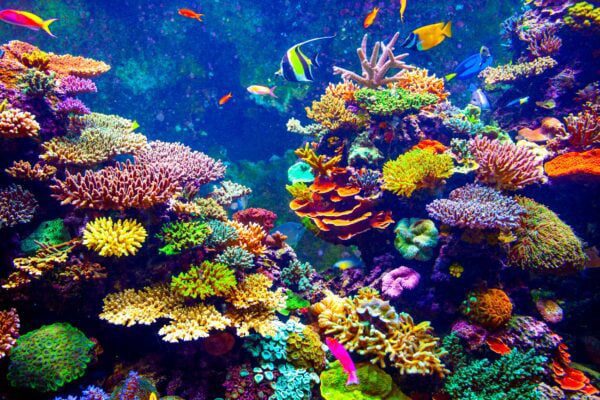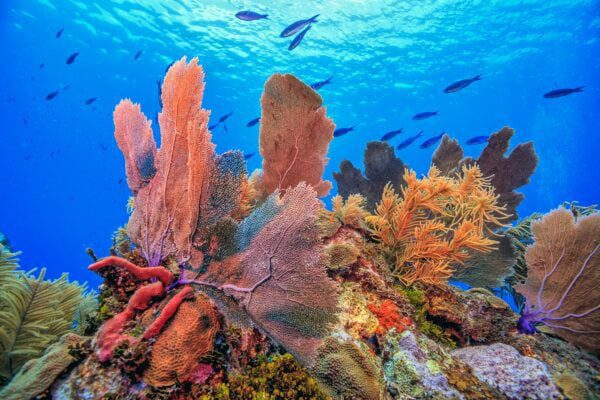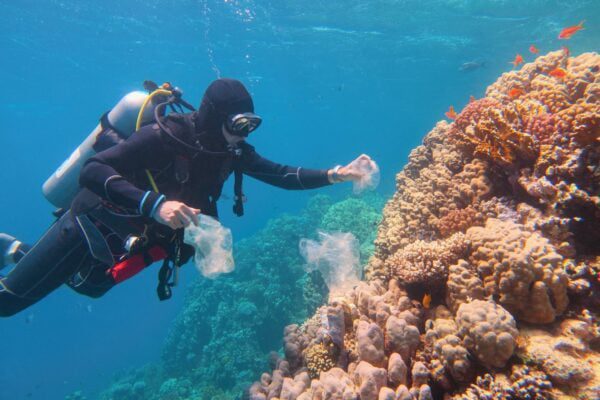Thousands of miles from Indiana’s cornfields, coral reefs are dying — and that matters to Hoosiers.
Though the ocean may feel distant, these vibrant ecosystems are critical to global biodiversity, coastal protection and even the air we breathe. Now, The Nature Conservancy (TNC) is racing to preserve coral reefs before they disappear for good. Their efforts could have far-reaching impacts, even for landlocked states like Indiana.
In a recent virtual event “Accelerating Coral Conservation,” TNC gathered a panel of experts to discuss the current state of coral reefs, their preservation efforts and partners and how those efforts may mean a brighter future for the planet.

Over the last 30 years, half of the word’s coral reefs have been lost to climate change, pollution and other threats. If this trajectory continues, over 90% will be lost by 2050.
“Many of you think of The Nature Conservancy as a land protection organization, but TNC has actually protected twice as much ocean as land,” said Jan Glendening, regional managing director for North America at TNC. “We’ve been at the forefront of coral protection for decades.”
Lizzie McCleod, TNC’s global ocean director, described the vital role coral reefs play in everyday life.
“They provide important habitat. They provide breeding grounds, so baby fish sometimes will come out and spend a part of their lifecycle on the coral reef,” McCleod said.
They are more than just homes for wildlife, however.

“These are really deeply interconnected, dynamic and energetic ecosystems,” said Tom Dempsey, TNC’s director of the California Oceans Program.
In addition to their role in the aquatic ecosystems, the reefs are also a source of money for livelihoods, with more than 1 billion people relying on their economic value. From tourism to fishing industries, the job of the coral reef is essential, according to Dempsey.
Coral reefs also play a crucial role in preventing flooding in coastal cities, saving around $4 billion in potential cost.
The coral reefs are vital to Hoosiers, too. The ocean is responsible for half of the oxygen released everyday through photosynthesis, making every other breath humans take a direct result from the ocean ecosystem at work.
“When we think about the future for human impacts, we have to think about not just the communities that are so close and adjacent to coral reefs, but communities around the world that may never see coral reefs, because whether they know it or not, they are benefiting from that diversity,” Dempsey said.

Coral reefs are bleaching, meaning dying due to hot water temperatures because of climate change, according to the panel of TNC experts. Loss of biodiversity from sedimentation, pollution, overfishing and destructive fishing are also to blame.
“We lose about a hectare, so about two acres, of coral reef every minute,” Dempsey said. “We restore in aggregate about the same amount of coral every year.”
However, the process of restoring the coral is tedious, and TNC has partnered with local organizations to speed up the process. They take the coral from the ocean, bring it back to a nursery, cut it up into small pieces and grow it in a controlled environment. When they get large enough, they can be replanted back into the reef.
The process is costly and labor intensive, so they began batch handling to make it faster. New software tools, new farms and partnering with local indigenous groups has created a pathway for restoration in the future for TNC, but the work continues to need support and education.
“What this means for us, what this means for everyone listening in today, is that this is an all-hands-on-deck moment,” McCleod said. “(These ecosystems) are so incredibly important to us … We still can protect the future for coral reefs on the planet, but the time is running out and we need to act with more urgency, more focus and more ambition to achieve that goal.”
For more information about TNC and their work to support coral reefs, visit nature.org.
USDA backs $7.9M restoration in southern Indiana – Indianapolis Recorder
Contact Health & Environmental Reporter Hanna Rauworth at 317-762-7854 or follow her on Instagram at @hanna.rauworth.
Hanna Rauworth is the Health & Environmental Reporter for the Indianapolis Recorder Newspaper, where she covers topics at the intersection of public health, environmental issues, and community impact. With a commitment to storytelling that informs and empowers, she strives to highlight the challenges and solutions shaping the well-being of Indianapolis residents.







